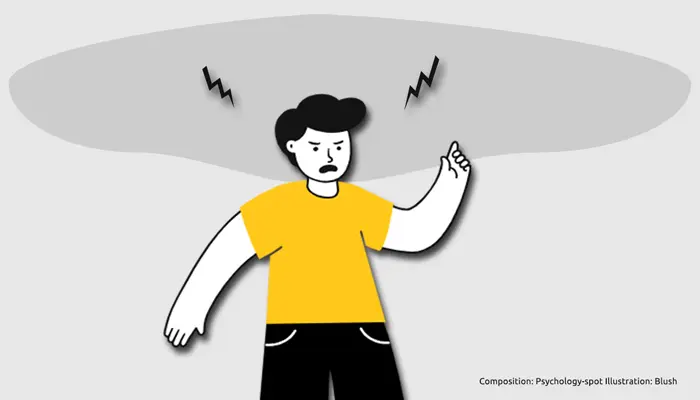
Permanent bad mood produces great emotional discomfort, both in those who suffer from it and in those who “suffer” that person. In fact, a persistent bad temper and a particularly irritable character are signs that something is wrong. In terms of interpersonal relationships, living with a person who is always in a bad mood can become a real nightmare. And it is not unusual for their chronic anger to end up infecting others, souring their character.
When a bad mood comes to stay
We all have days or periods when we can be more irritable and hostile. It is perfectly normal. However, people who have a chronic bad mood always respond negatively, which is why they end up undermining the harmony of interpersonal relationships.
They react by becoming defensive at the slightest attempt at criticism, they get angry easily and their emotions run high. Almost everything seems bad to them and they are specialists in seeing the negative side of things.
As a result, living with a person who is always in a bad mood is like walking on breaking glass. We constantly feel on the tightrope because we don’t know when the next “explosion” will occur that forces us to take shelter.
These people often test our personal limits. To maintain a certain harmony, we are forced to use patience and large doses of tolerance, but enduring this bad mood ends up taking its toll on us in the long term.
We may feel that we are living in a deeply unfair situation because we must put up with his bad mood and, on top of that, treat him well. It is understandable that our patience runs out and we end up exploding. However, we must avoid reaching that point – for the sake of our mental balance.
See the world through their eyes
People who are always in a bad mood are particularly sensitive to the small frustrations of everyday life, making it very difficult for them to ignore or overcome them. As a result, they often fall into a loop of negativity.
Their attention is continually focused on what bothers them – which is almost everything. In this way, even the most trivial incidents or comments trigger an intense emotional response. When we live in that state permanently, it is difficult to notice the positive things.
Furthermore, this constant agitation and annoyance ends up consuming a large amount of psychological resources, so that it reduces the “bandwidth” that they can allocate to other activities. This generates added difficulties and becomes a further source of frustration. This closes the loop of bad mood.
In fact, people who are always in a bad mood live in a state of constant frustration. When we feel fulfilled and happy, bad moods have no place. On the other hand, when we feel frustrated, disappointed or unmotivated we radiate negative energy.
In some cases, that irritability could even be the symptom of something more serious, like brewing depression. Or it could indicate a thyroid problem or lack of rest due to disorders such as sleep apnea, or an underlying disease that causes chronic pain. There are many physical conditions that cause bad moods.
That means that, to deal with a person who is always in a bad mood, we need a good dose of empathy. We must try to put ourselves in their shoes to understand how their circumstances, life experiences or way of thinking are generating this irritability.
After all, a person who is always in a bad mood is usually suffering from something. Trying to walk in his shoes will allow us to understand what happens to him without judging, although that does not mean justifying him or accepting his behavior as good.
5 keys to dealing with people who are always in a bad mood
1. Don’t take it personally
It’s hard. But to deal with the bad mood of others and prevent it from unbalancing us, it is best to assume a psychological distance. There are a thousand and one reasons why that person may feel irritable and, although our comment or attitude is sometimes the straw that breaks the camel’s back, it is likely that the reasons for their discomfort are much deeper. It is important not to get carried away by pessimistic or blaming thoughts. Blaming others or yourself will only generate more frustration and resentment.
2. Stay calm
It’s also complicated, but it’s the only way to deal with people’s bad moods without exposing ourselves to them making ours sour. The worst thing we can do is absorb that energy and start projecting it by responding in the same way. Therefore, we must breathe deeply and try to relax. It will help us to imagine that this person brings us an unwanted “gift”, a bad mood. We can accept it or reject it kindly. The key is to prevent their irritability, frustration and anger from dragging us down.
3. Abandon the “mechanical” mentality, become a mirror
One of the main mistakes we usually make in interpersonal relationships is trying to “fix” people. This mentality leads us to value judgments and a spiral of vain attempts to make the other person change, which ends up emotionally draining us. In reality, most people just need understanding. Therefore, the ideal is to become a mirror that reflects your emotions. If he tells us: “You never listen to me, you only criticize me”, we can respond: “I understand that my words make you angry, what do you need to tell me?”
4. Don’t reward a bad mood
It is important not to comply with that person’s demands in the hope that his mood will improve or respond with irritability since in this way we will only reinforce his behavior. Every time we pay attention to a behavior, we are validating it. For this reason, it is better to apply the extinction principle, which states that when we ignore a behavior, it will eventually disappear. Of course, that doesn’t mean we will “cure” the person’s bad mood, but we will encourage them to control their expression at least in our presence. For example, we can say: “I see that you are in a bad mood, we will talk when you calm down.”
5. Validate your emotions
Dealing with people who are always in a bad mood is not easy, especially when they are part of our lives, so we must make sure to keep track of our emotions to prevent their irritability and discomfort from infecting us. It is important to avoid blaming ourselves for feeling stressed, frustrated or even fed up.
Instead, we should take note of those emotions, but without getting carried away by them. Therefore, we must make sure to take breaks, disconnect and do those things that allow us to recharge our batteries to prevent tension from growing inside us and turning into deep irritability.
Finally, if your bad mood threatens to become unbearable, you may want to address the problem directly. We should explain to that person how we feel and ask them to talk about their feelings. You are probably also having a hard time and don’t know how to get out of that loop of negativity. We can even suggest him to go to a psychologist to help him identify the causes of that bad mood and provide him with tools that allow him to deal with those negative emotions in a more assertive way. That way we will all win.



